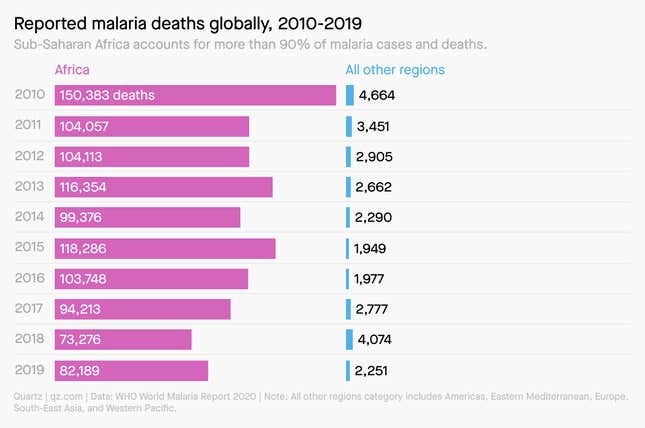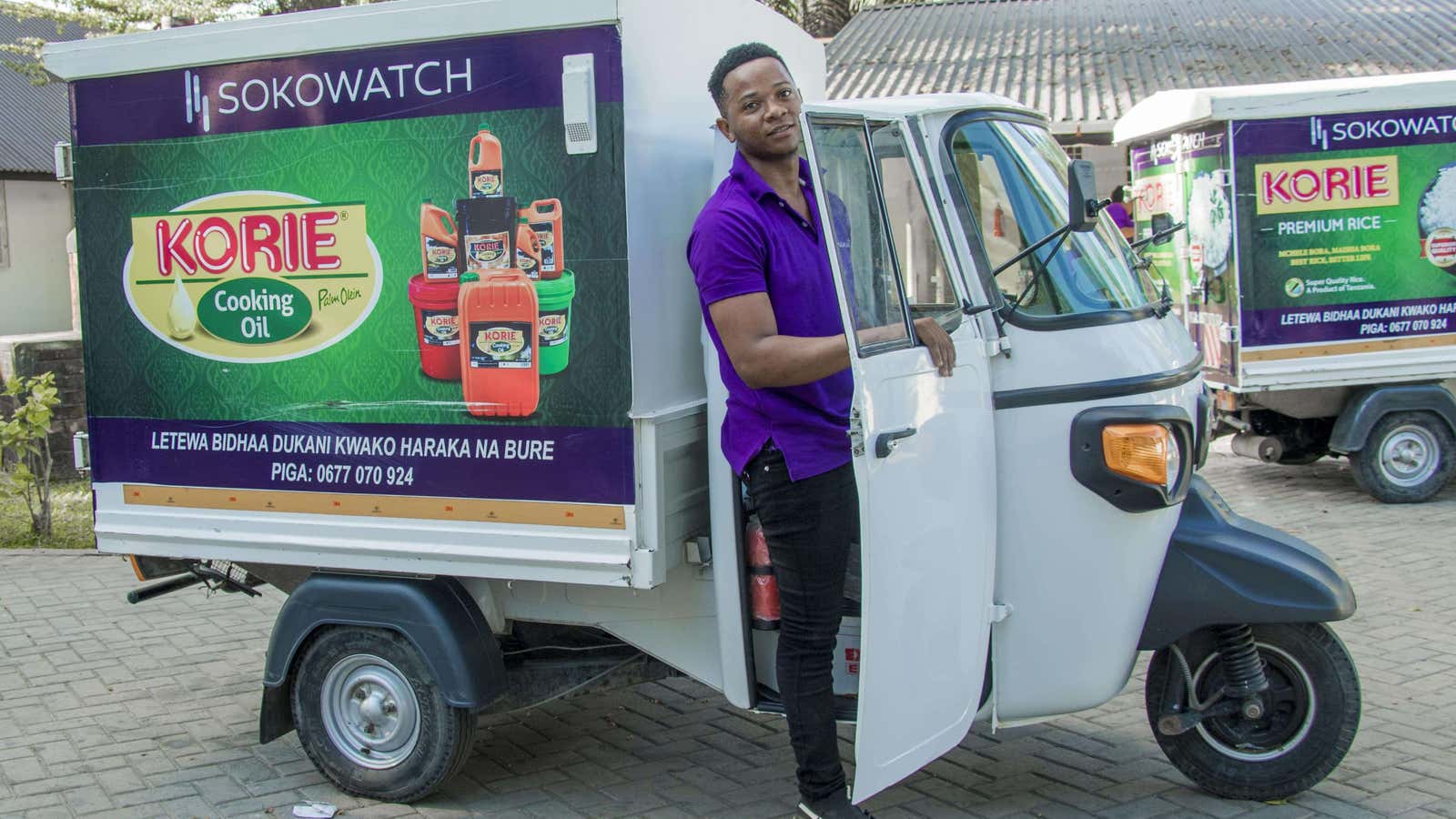Hi Quartz Africa readers!
The announcement of a new highly effective vaccine under development has been heralded as a breakthrough in the fight against malaria, which is particularly prevalent and deadly in Africa.
Sub-Saharan Africa accounts for more than 90% of the world’s malaria cases and deaths. The preliminary report has raised hopes that doctors might have a highly effective and safe malaria vaccine in their hands in the near future. But African governments must make early plans to access doses of the potential malaria vaccine and avoid repeating the mistakes they made with Covid-19 vaccines.

The challenge of accessing Covid-19 vaccines has shown that African governments need to be proactive and directly involved in vaccine procurement. Efforts to negotiate deals and secure a diverse portfolio of Covid-19 vaccines with different manufacturers have come too late, negatively impacting access to the vaccines in the continent.
“Currently, approximately 40 of the 54 African countries rely on Gavi/Unicef for their vaccines completely or in part,” said Patrick Tippoo, the executive director of the African Vaccine Manufacturing Initiative. “These African countries have very little influence over where these vaccines are sourced from, and [this arrangement] is not an enabler of building sustainable vaccine manufacturing capacity on the continent.”
Urgent investment in local vaccine development and manufacturing capacity remains a more sustainable solution to the vaccine access problem in Africa. “This is the time for African governments to start building capacity to make vaccines locally, so that when the malaria vaccine is made, if we have the systems in place and the intellectual property on it is waived, we can start making it locally,” says professor Gideon Awandare, of the West African Center for Cell Biology of Infectious Pathogens. “Waiting for others to produce it for us to order is not a good strategy.”—Uwagbale Edward-Ekpu
Five stories from Quartz Africa
Startups pay it forward. Sokowatch, an e-commerce platform for informal retailers in Kenya, Tanzania, Rwanda, and Uganda, has implemented an employee stock ownership plan since 2018. As Carlos Mureithi reports, the company believes the arrangement will help it retain workers, and if adopted more widely, could promote equity and shared ownership among Africa’s tech startups.
Andela looks beyond its African roots. The developer outsourcing company, which launched seven years ago in Nigeria, has announced plans to expand beyond its African beginnings and leverage the growth of engineering talents in Latin and South America. The company says that increased competition and the challenges related to expansion won’t take away from its support of African talent, Tolu Olasoji reports.
A winning documentary makes for a complicated success story. South African documentary My Octopus Teacher was a huge hit on Netflix, and recently won the Oscar for Best Documentary Feature. But the fact that it focuses on the perspective of a well-off white male makes the question of its impact on the local film industry a complex one, Liani Maasdorp and Ian-Malcolm Rijsdijk opine.
Can lost tourism revenue justify elephant hunting? Zimbabwe’s intention to sell the right to shoot 500 elephants this year has revived a bitter debate over the role of hunting in the country’s public parks, reports Farai Shawn Matiashe. The wildlife agency says the move will help make up for the financial hit it took from the Covid-19 pandemic, and is a necessary part of its animal population control. But conservationists aren’t buying the reasoning.
Tanzania plays catchup. New president Samia Hassan has announced some of the country’s strictest Covid-19 measures, marking a departure from her predecessor. The measures include quarantine requirements, and a ban on flights to and from India, Priya Sippy reports. But with new strains present and no information whether the country will procure vaccines, will the new measures be enough?
By the digits

$31 billion: The estimated combined value of sub-Saharan Africa’s apparel, textile, and footwear market.
$1 trillion: The potential of the entire value chain of African fashion, from raw materials to the final product.
280 million: The number of online shoppers in Africa
£71: The current cost of the coat worn by Beyoncé at the movie premiere of Annie in 2014 and made by African fashion brand Kisua.
300,000: The number of people who watched the latest virtual New York Fashion Week collection of South African brand Maxhosa, which contributed designs to Eddie Murphy’s Coming 2 America.
$30,000-$3 million: The amount new fashion-focused investment firm Birimian Holdings will provide African brands in long-term financing to support their growth and potential.
Many of Africa’s fashion entrepreneurs operate in the informal sector. A lack of wide access to capital, low production capacities, and small distribution networks limit the industry’s growth potential. Carlos Mureithi reports on what the launch of Birimian Holdings, a new investment company focusing exclusively on fashion, means for the industry.
Dealmaker
Lami Technologies, a Kenyan insurtech startup that aims to democratize insurance products and services for low-income Kenyans, has announced a $1.8 million seed round. It was led by Accion Venture Lab with participation from AAIC, Consonance, P1 Ventures, Acuity Ventures, The Continent Venture Partners, and Future Africa. The fund will help to accelerate its growth and increase its presence across Africa.
Carry1st, the first Africa-focused mobile games publishing platform, has raised $6 million in Series A funding. The investment was led by Konvoy Ventures, with participation from Riot Games, Akatsuki, (publishers of League of Legends and Dragon Ball Z respectively), Raine Ventures, and TTV Capital. The fund will be used to secure partnerships, scale existing portfolios of games and accelerate Carry1st’s growth.
Expensya, a Tunisian-French B2B expenses management solution, has raised $20 million in Series B funding. Two new investors, MAIF Avenir and Silicon Badia added their contributions to funding previously invested yb ISAI and Seventure Partners. The SaaS startup aims to accelerate its product development and international growth with the funding.
Quartz Gems
Company founders have more ways to go public than ever before—and it’s shifting power from Wall Street to management.

Quartz’s latest field guide offers a complete overview of the future of the IPO, from exploring alternatives, to what’s next for SPACs, to the rise of the retail investor.
Want to chart your own rise? Sign up for a Quartz membership to understand what’s changing in the world of finance, including how the IPO, a critical cog in the global financial system, is being disrupted. Subscribe here.
Other things we liked
The illicit roots of the charcoal powering your summer BBQs. Some of the charcoal used for grills in Europe and the US are illicitly and stealthily imported from Nigeria, causing deforestation and exacerbating the climate crisis. For New Republic, Chikezie Omeje dove into the complex world of illegal charcoal trafficking.
Makeup as a form of resistance for queer folks. In Nigeria, where queerness is criminalized, experiments in beauty have become one way people can walk the fine line between self-expression and activism. For Allure, Vincent Desmond details the experience of five queer Nigerians who are using makeup as a way to express their identity.
Billie Zangewa makes art where the light is best. The Malawian artist weaves delicate tapestries on silk depicting pandemic-induced transitions; from remote living as a single mom and the feelings of hopeless wanderlust, to rediscovering her kitchen. Stephen Wallis talks to the artist for the New York Times.
Footballers and the Ramadan conundrum. For New Frame, Maher Mezahi asks how top Muslim athletes manage to play at the highest levels of sports such as football while undertaking religious fasting. Ultimately compromises are made, by players and managers alike.
Trust issues. As the world considers using the role of vaccine passports in post-pandemic travel, Nanjala Nyabola looks at the implications of recent digital ID programs in India and Kenya for Rest of World. These systems, she argues, can only make governments more efficient at what they’re already doing, but can’t create values that don’t already exist.
ICYMI
Rewarding a mobile focus. The ASIP Accelerator Program, backed by the Telecel Group, is looking for incorporated startups working in fields such as voice recognition, IoT, cross-border payments, robotics, technology stacks, and cloud computing. It will offer group workshops, mentoring, collaboration with entrepreneurs, and discussion forums as well as €500,000 in benefits. (May 14)
Support during crucial phases. Applications are now open for Google’s three-month online Google for Startups Accelerator, open to applications from 17 countries across Africa. Successful tech startups will get mentorship, product support, and training. (May 17)
Certification for female digital professionals. Sticking with the search giant, its “Grow with Google” program, together with Unicef and Umuzi, has 50 spots available for a nine month web development bootcamp for women and displaced youth from Kenya, Uganda, Ethiopia, or Burundi. (June 1)
Keep an eye on
Vaccine waivers. The US reversed a previous stance and came out in support of waiving patent rules on Covid-19 vaccines. It’s not enough on its own—World Trade Organization member countries will have to back the proposal as well. But, as Carlos Mureithi reports, if approved, the waiver would allow poorer countries to begin making vaccines locally, a shift that Africa’s Centers for Disease Control says would give the continent an opportunity to scale its own vaccine manufacturing amid climbing case counts in some countries.
Master the art of connecting and networking. The internet promised to bring us closer together, but building networks and authentic professional relationships in many ways seem harder than ever. In Quartz’s newest workshop, we’ll hear from experts on where to find people who can help you in your career, the art of reaching out, and ways to pay things forward. Whether you’re looking for a mentor, a job referral, an “in” at a prospective employer, or a connection with curious-minded people like yourself, you’ll find something to help you. Register here, then join us on May 13 from 11am-12pm US eastern time.
🎵 This brief was produced while listening to “The Way to Nice” by Mulatu Astatke (Ethiopia).
Our best wishes for a productive and ideas-filled week ahead. Please send any news, comments, suggestions, ideas, ethical alternatives to charcoal, and silk tapestries to [email protected]. You can follow us on Twitter at @qzafrica for updates throughout the day.
If you received this email from a friend or colleague, you can sign up here to receive the Quartz Africa Weekly Brief in your inbox every week. You can also follow Quartz Africa on Facebook.
